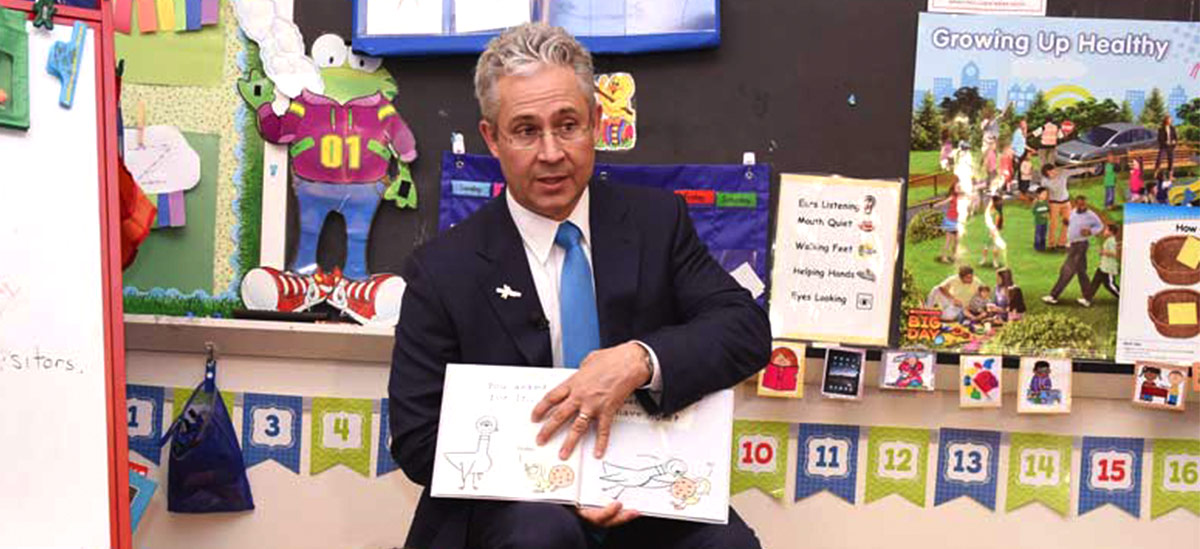
By Lou Cestello, Head of Regional Markets at PNC
PNC has championed high quality early childhood education through PNC Grow Up Great, which has provided tools and resources to help develop curious young minds since 2004. Over the last 18 years, this work has grown into a $500 million initiative— understanding that the first five years of life represents one of the most critical times in a child's life. In fact, experts say that up to 90% of a child's brain develops by age five.
As a leader at PNC, one of my key responsibilities is to ensure that ours is an organization that does good while also doing well. Financial performance is critical, but giving back to the communities where we live and work is also paramount. Our success is proportional to the success of those we serve in each of our communities. That's why we consistently seek opportunities to invest our resources where they can have the greatest impact.
Our PNC Grow Up Great initiative has proven to be one of our most impactful – and most financially sound – community investments.
To date, more than 8 million children across the country have been supported through PNC's local grants and educational programming. I want to share a few of the reasons why we support these initiatives:
1. It can narrow the achievement gap.
We know that gaps in knowledge and ability between children with little-to-no access to necessary resources and their more advantaged peers start to appear long before kindergarten, and those gaps tend to persist throughout life. These gaps are difficult and costly to close, which is why PNC supports a proactive approach to cognitive and social-skill development through its investments in quality early childhood programs: It is more effective and more efficient than trying to close the gap later.
2. It can boost earnings.
The HighScope Perry Preschool Project1 – a landmark, long-term study of the effects of high-quality early care and education on low-income 3- and 4-year-olds -- showed that children who attended high-quality preschool programs had 34% higher basic achievement at age 14. Additionally, 17% more graduated high school, 14% more were employed at age 40 and by the age of 40 their annual income was 20% higher than similar employees who did not participate in early education as children. Children who attend high-quality early learning programs have higher graduation rates, employment and higher annual income. This can also mean better physical and mental health, increased civic engagement and a healthier society overall.
3. It impacts parents' earnings, too.
The impact of high-quality early childhood education goes beyond the cognitive and social benefits for children. There is also a substantive impact on parents' employment and their earnings.
When children have access to high-quality child care, of which high-quality early education is a critical component, parents can go to work knowing their children are in a safe and nurturing environment. Prohibitively high costs and lack of access to child care are forcing parents to make a difficult choice – either work and spend a high percentage of their income on child care or give up work to stay home and provide care.
Mothers are often disproportionately affected by the lack of options for high-quality early learning as well.
For example, throughout the COVID-19 pandemic, mothers were more likely to stay home and provide caregiving. As a result, today's women's labor force participation rate2 stands at 57.1%, the lowest it has been since October 1988.
The ability to return to work without worrying about the cost and quality of child care allows women to advance their careers. Economic analysis shows that as women's labor force increases, so does the U.S. GDP (Gross Domestic Product). Therefore, investing in early care and education will spur stronger maternal workforce participation, and closing the gender employment gap will boost productivity and catalyze a thriving economy.
4. It impacts the economy.
The investment in early childhood education generates an economic return in the form of long-term family and societal cost savings by contributing to further improvements in child development and wellbeing, as well as decreased spending on social services. Without access to high-quality affordable care and education, workforce productivity and revenue decrease. In fact, one study found a $57 billion annual cost to the economy – or about $180 per person in the U.S. – due to child-care-related lost earnings, productivity, and revenue, including nearly $13 billion that employers shoulder due to workers' inability to access high-quality, affordable care.3
5. It's a solid investment.
With investments in high-quality early childhood education generating up to a 13% return4 on investment, this initiative is one of the best uses of our community investment dollars. Beyond the reasons I've already cited, investing in high-quality early childhood education generates community benefits that help business, communities and the people who live in them. Those investment dollars also ultimately improve property values, provide cost savings for municipal school systems for K-12 education, reduced crime rates and a reduced reliance on government assistance, which helps entire communities thrive.
For nearly 20 years, PNC has supported quality early childhood education through more than $200 million in grants and more than 1 million employee volunteer hours. We've impacted the lives of 8 million children through PNC Grow Up Great and our collaborations with early learning experts and nonprofit organizations including Sesame Workshop, the National Head Start Association and Fred Rogers Productions. We remain committed to this work because it's the right thing to do.
Much of the work we do at PNC makes me proud, but the significant and far-reaching impact of this work is especially gratifying and leaves me optimistic for the future.



